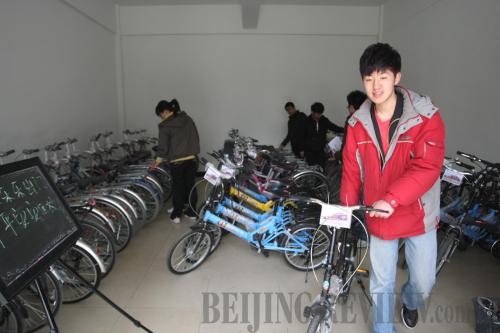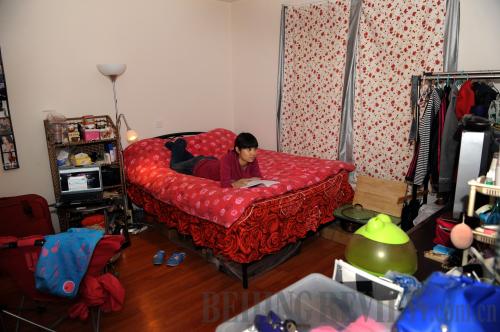|
 |
|
RENTING CONVENIENCE: A student rents a bicycle at Nanjing University Town (CNSPHOTO) |
Yang Zheng is a senior at Tsinghua University. He is considering renting an apartment in Beijing with a friend after graduation.
"It's very likely I cannot afford an apartment in this expensive city even after working three to five years, so I choose to rent one," Yang said.
With an average monthly income of about 2,300 yuan ($354), less than one 10th of the average housing price per square meter within Beijing's Fifth Ring Road, many new university graduates share Yang's problem. When buying an apartment is not an option, renting is worth considering.
In fact, renting is nothing new. According to an online survey by China Newsweek, more than 80 percent of 14,000 respondents were renters.
But today, renting has been taken into a new level, a "full rental lifestyle." In addition to apartments, cars, costumes, tuxedos, and digital products such as cameras and projectors, even friends and time are included in renters' categories.
These compulsive renters are known as the "hire clan," or hazuzu. Their philosophy is to spend less money, have fun and improve living standards while avoiding wastes, allowing them to save for necessities.
Xia Xueluan, a professor in sociology at Peking University, said the economic downturn, coupled with worsening inflation and low starting pay, had made renting a sensible option for career starters.
"Young people have been forced to adopt this more rational way of spending and living a low-cost lifestyle," said Xia. "It's a reflection they have gradually been influenced by reality rather than idealism."
A kind of attitude
Yang came from a financially strapped rural family in northwest China's Gansu Province, so he always has to consider renting rather than buying things to relieve his family's burden.
Recently, Yang has been busy looking for jobs and attending interviews. He cannot afford to buy designer clothing, so he visits a clothing rental store every time he has an interview.
"It's convenient for us because the clothing rental store offers a tailored service to students like me for job interviews. We only need to pay 10 yuan-20 yuan ($1.46-$2.93) a day for a suit," he said.
Except for renting clothing to students, according to Zu Ping, who runs the clothing rental store located in the Wudaokou business area near Tsinghua University, her store also rents business apparel to office workers and performing attire to actors and actresses.
"Business apparel is more expensive. The rental prices are 80 yuan ($12.31) to 300 yuan ($46.20) per suit a day," Zu said. "In peak times, I rent out more than 100 suits a day."
Maybe students such as Yang are forced to rent, but many other young people consider renting as part of an easy lifestyle.
They live in a rented apartment, sleep on a rented bed with their rented pet nearby, turn on the rented air conditioner, put their rented DVD into a rented player and watch from a rented television, drive a rented car to work, wear rented clothes for dates, take rented designer bags to parties, hike with rented jackets and boots, travel with rented tents and cameras, and even chat with rented friends.
This kind of lifestyle seems strange in China and is quite a departure from the traditional Chinese idea of ownership. Most Chinese are reluctant to rent clothes, air conditioners, pets and electronics, even if they accept the practice of renting expensive apartments and infrequently used camp tents.
Though most wedding outfits are rented, many people consider worn clothing uncomfortable and dirty, even if they were only worn once and were dry-cleaned. For electronics and pets, most people are more willing to buy and own rather than rent.
However, members of the hire clan have abandoned the old concept and are promoting the idea of renting a life.
Deng Linlin is a reporter at a fashion magazine in Beijing. She firmly supports the idea of renting and is proud of being a member of the hire clan.
"By renting things I need, I can have fun and achieve a trendy life with fairly low costs," she said.
Deng often rents evening dresses and luxurious jewelry for social events.
"Some people might say I'm too materialistic, but it's necessary for me to dress appropriately for these events considering my job. I can't just wear jeans to all those events," she said.
Besides, she also rents bags, plants, pets and digital products such as cellphones and cameras.
"Technology is advancing rapidly and models are frequently updated, especially in terms of digital products. It's impossible for me to keep up with the speed, without spending a large amount of money," Deng said.
Many of Deng's friends allegedly have bought expensive things they don't often use, such as projectors, fax machines, and popular digital single lens reflex cameras.
"It is also an environment-friendly lifestyle to share and make full use of resources, just like buying second-hand things," Deng said.
Many people have also posted advertisements online to rent out VIP cards for luxury stores, clubs, restaurants and spas for 5 yuan-10 yuan ($0.77-$1.54) a day. Others even extend the idea of renting to intangibles, such as time and talent.
It's not uncommon to see postings by unemployed folks and students saying "Rent Me."
They offer their time to run errands, pick up people at the airport, play the role of assistants at dinner with clients, feed and walk pets and line up for popular concert tickets. The hourly rate is usually 150 yuan ($23.10) to 300 yuan, with additional costs for transport.
Some even offer to listen to somebody's troubles, tell jokes or play the role of boyfriend or girlfriend in family gatherings.
A promising market
 |
|
A RENTED LIFE: Li Liwei watches TV in her rented apartment on April 14. Li came to Beijing in 2007 from Linyi in east China’s Shandong Province to pursue a performing career (ZHAO PENG) |
With more young people joining the hire clan, some special rental companies, shops and websites have emerged.
On April 2, Guangdong Oursjia Rental Service Co. opened a rental store in Chaoyang District in Beijing. The store's advertisement says, "You can rent anything you can think of here."
Located to the east of Chaoyang Park, the 10,000-square-meter self-service store packs in a plethora of goods, from 10-million-yuan ($1.54 million) Rolls Royce cars and luxury handbags on the first floor to baby carriages, fitness equipment and furniture on the second and home appliances and digital equipment on the third floor.
Everything on offer is brand new. After customers signed an agreement and pay a deposit, the store will deliver the items he or she ordered for free within three days, according to store staff.
Zhao Xiaoling, who was checking out children's toys with her two-year-old son, said she could see the benefit in renting, as many parents agonize over what toys to buy their children and regret the costs when a child loses interest in a gift.
"For 980 yuan ($151) for six months, I can rent many toys for my boy. The rental fee is cheaper than it would be to buy," she said. "Renting is a good way to give him a variety of choices at a reasonable price."
Oursjia has opened 59 stores nationwide within four years.
Jiang Hongwei, Chairman of Oursjia, said the company's customers consist of individuals and companies and government agencies. He believes consumption ideas are changing among customers and his business will continue to see a huge boost.
"China is undergoing a revolution in consumption idea. There are currently 20 chain rental companies now in China. My prediction is, within three to five years, foreign rental companies will enter the Chinese market," he said.
A survey by national broadcaster CCTV found 80 percent of respondents prefer to rent when the items are for short-term or mid-term use. Sixty percent said they do so to save money and 15 percent to satisfy their curiosity about the item, which might be new to the market or something they have never used.
"Rental business in China is just starting to take off. There's a large potential market for its development," said Zhang Zhigang, President of the China General Chamber of Commerce.
"Oursjia also targets high-income customers, especially those who temporarily work in the city but want higher living standards," said Jiang. "The longer a customer wants to rent an item, the cheaper it is. And if a customer wants to eventually own what he or she has rented, they just need to pay the balance."
Meanwhile, rental websites, such as Chinarents.com, Chinaleasing.org and Zulinbao.com, have also mushroomed. Using the platform, people can rent different things by clicking a mouse at home.
Many non-rental companies also see business potential in renting and post advertisements on rental websites. The idea is that all deals are a kind of rental.
However, Lai Yang, Director of the Business Research Institute of Beijing Vocational College of Finance and Commerce, said it would take time for the business model of renting to be accepted by more people in China.
"This kind of business in China lags far behind what goes on overseas," Lai said, adding local consumers prefer to own rather than rent products.
On the popular websites and online forums, there are thousands of discussions about renting.
Many people are still not sure how much they can save by renting and are concerned whether suppliers are reputable. Lai also recommended consumers pay close attention to the small print in leasing contracts, particularly clauses that deal with accidents and damage during the rental period. | 